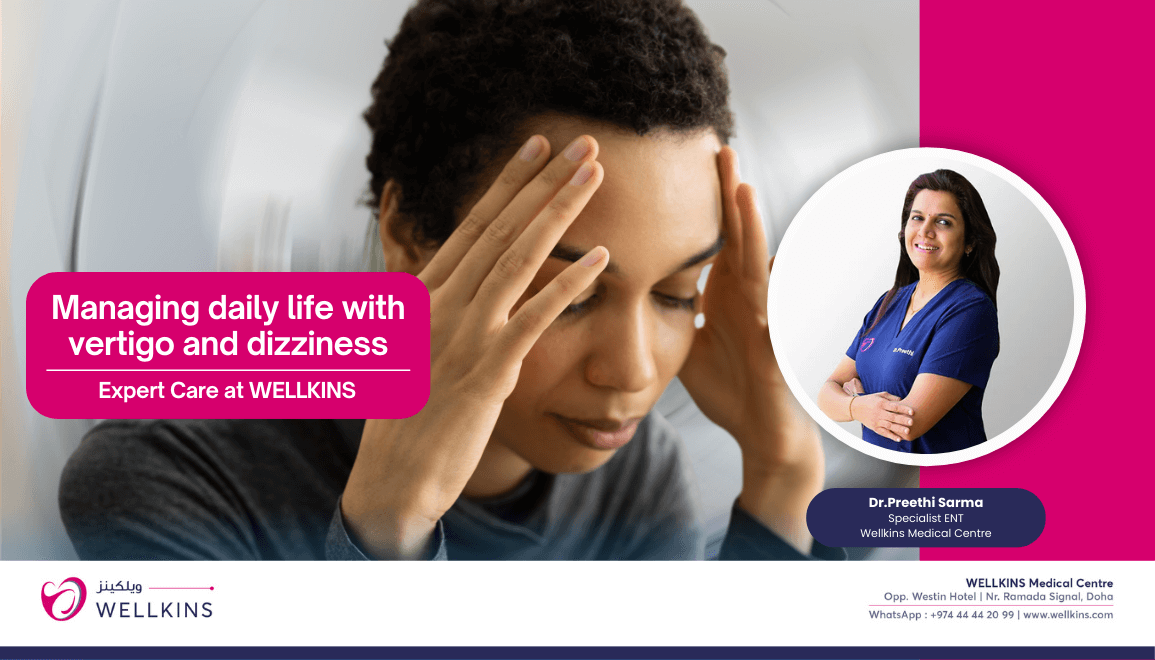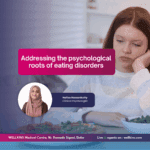Author: Dr. Preethi Sarma (ENT Specialist – WELLKINS Medical Centre)
Vertigo and dizziness are common symptoms that can be unsettling and disruptive to daily life. While often used interchangeably, they are distinct sensations that can be indicative of various underlying conditions. Understanding the difference between these two and their potential causes is the first step toward finding relief and managing your symptoms effectively.
Vertigo and dizziness are common conditions that affect millions of people around the world. Vertigo and dizziness can develop suddenly and cause severe discomfort. Fortunately, there are steps you can take to prevent acute episodes of vertigo and dizziness and reduce the risk of getting them in the first place.
What are Vertigo and Dizziness?
Vertigo: This is a specific type of dizziness characterized by a sensation of spinning or whirling, either of yourself or your surroundings. It often feels as if the room is moving or tilting, and can be quite disorienting. This sensation is typically a symptom of an issue with the vestibular system, the part of the inner ear and brain that is responsible for our sense of balance. The feeling can range from a mild, fleeting sensation to a severe, incapacitating episode that makes it difficult to stand or walk.
Dizziness: This is a more general term that encompasses a range of sensations, including lightheadedness, faintness, unsteadiness, or a feeling of being off-balance. Unlike vertigo, dizziness does not involve a spinning sensation. It can feel like you are about to faint or that your head is fuzzy. This more general feeling can be caused by a wide variety of factors, from simple dehydration to more complex medical conditions.

Common Causes of Vertigo
Vertigo is most often caused by problems within the inner ear or the brain. Some of the most common causes include:
Benign Paroxysmal Positional Vertigo (BPPV): This is the most common cause of vertigo. It occurs when tiny calcium crystals (otoconia) in the inner ear become dislodged and move into one of the semicircular canals. This sends false signals to the brain, causing a brief, intense spinning sensation, often triggered by changes in head position, such as getting out of bed, rolling over in bed, or looking up. The episodes are usually short-lived but can be very intense and alarming.
Meniere’s Disease: This chronic inner ear disorder is characterized by a triad of symptoms: episodic vertigo, fluctuating hearing loss, and a feeling of fullness or ringing (tinnitus) in the affected ear. The exact cause is unknown, but it is believed to be related to an abnormal fluid buildup in the inner ear. The unpredictable nature of the attacks can be particularly distressing for those who suffer from this condition.
Vestibular Neuritis or Labyrinthitis: These are inflammatory conditions of the inner ear or the vestibular nerve. They are often caused by a viral infection and can lead to a sudden, severe onset of vertigo, often accompanied by nausea and vomiting. Labyrinthitis also involves hearing loss. The symptoms can be quite debilitating initially, but they usually improve over time as the body recovers from the infection.
Migraines: Some people experience vertigo as part of a migraine aura, even without a headache. This is known as a vestibular migraine. The episodes of vertigo can last anywhere from a few minutes to several hours and may be accompanied by sensitivity to light and sound.

Common Causes of Dizziness
Dizziness can be caused by a wider range of conditions, not all of which are related to the inner ear. Some of the most common causes include:
Orthostatic Hypotension: A sudden drop in blood pressure when moving from a sitting or lying position to a standing position. This can cause lightheadedness or a feeling of faintness, as blood flow to the brain is temporarily reduced. This is a common occurrence and can be managed by making slower, more deliberate movements when changing position.
Dehydration: Not drinking enough fluids can lead to a drop in blood volume, causing
lightheadedness and a feeling of unsteadiness. This is especially common in hot weather or during periods of intense physical activity. Ensuring adequate fluid intake is a simple but effective way to prevent this type of dizziness.
Low Blood Sugar (Hypoglycemia): People with diabetes or those who have not eaten in a long time may experience dizziness due to low blood sugar. This can be accompanied by shakiness, sweating, and confusion. Eating a small snack can often quickly resolve these symptoms.
Medication Side Effects: Many medications, including those for blood pressure, depression, and anxiety, can cause dizziness as a side effect. It is important to discuss any new or worsening symptoms with your doctor, as a change in dosage or medication may be necessary.
Anxiety and Panic Attacks: Feelings of lightheadedness, unsteadiness, and faintness are common physical symptoms of anxiety and panic disorders. The hyperventilation that often accompanies these attacks can reduce blood flow to the brain, leading to a dizzy sensation. Learning to manage anxiety can help alleviate these symptoms.
When to Seek Medical Attention
While many cases of vertigo and dizziness are not serious, it is important to seek medical advice for a proper diagnosis and treatment. You should seek immediate medical attention if your vertigo or dizziness is accompanied by any of the following symptoms, as they may indicate a more serious underlying condition:
- A severe headache that is different from your usual headaches.
- A high fever that does not respond to over-the-counter medication.
- Double vision or vision loss that occurs suddenly.
- Numbness or tingling in any part of your body.
- Slurred speech or difficulty walking, which could be a sign of a stroke.
- Weakness in your limbs, which may indicate a neurological issue.
- A new type of headache you’ve never experienced before.
These “red flag” symptoms require immediate professional evaluation to rule out or treat serious conditions.

Treatment and Prevention
The treatment for vertigo and dizziness is tailored to the specific cause and severity of your condition. Your doctor will work with you to create a personalized plan to help manage your symptoms and address the root of the problem. Beyond specific medical interventions, a significant part of managing and preventing episodes of vertigo and dizziness involves lifestyle adjustments. Making simple, yet effective, changes to your daily routine can contribute to a healthier balance system and reduce the frequency and severity of your symptoms. These changes may include staying properly hydrated, managing your blood pressure, and avoiding triggers such as loud noises or certain dietary components.
While it may not be possible to prevent every episode, taking proactive steps can make a substantial difference. Regular exercise, a balanced and nutritious diet, and effective stress management techniques can all contribute to your overall well-being and help your body maintain its natural sense of balance. These simple habits can have a profound impact on your quality of life.
Dealing with persistent vertigo or dizziness can be incredibly unsettling, impacting your daily well-being. Getting prompt support and an accurate diagnosis is crucial for finding relief. At WELLKINS Medical Centre, we provide a personalized care for individuals experiencing these symptoms. Following a thorough assessment, our specialists will help you understand the cause of your condition and create a treatment plan to help you regain your sense of stability and live with confidence.
Read more about the ENT services at wellkins here: https://wellkins.com/ent/






